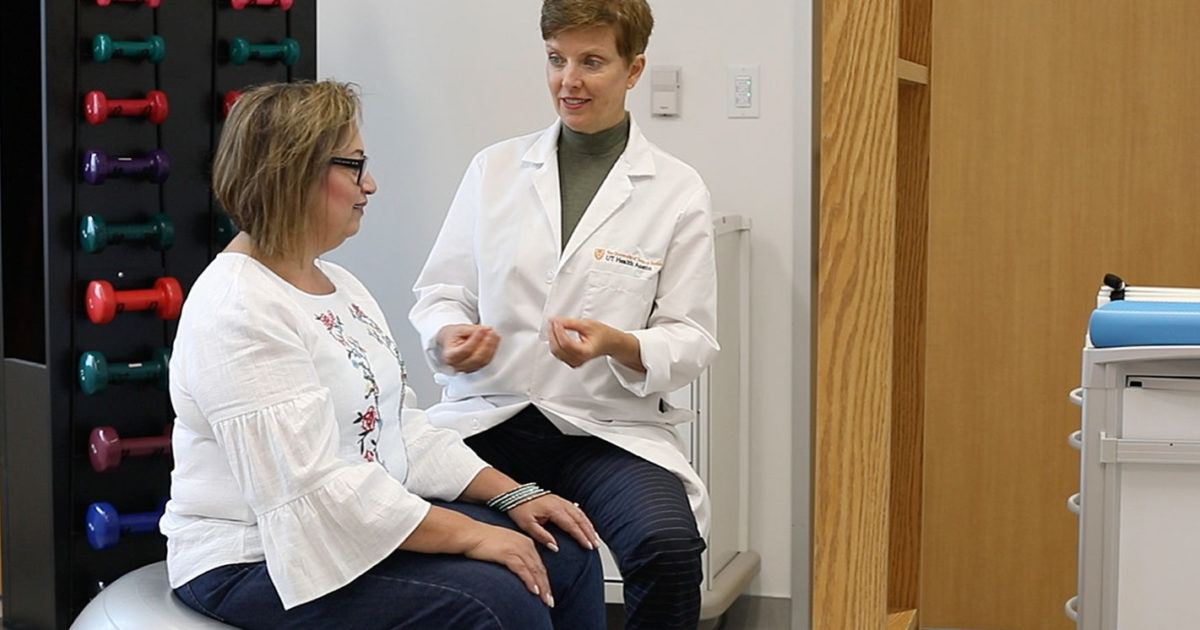Pelvic Floor Pro Says Kegels Are NOT for Everyone
UT Health Austin pelvic floor physical therapist shares insights into pelvic health
Written by: Lauryn Feil

American gynecologist Arnold Henry Kegel first wrote about kegel exercises as a non-surgical treatment for female genital relaxation in 1948. Since then, the technique has been widely adopted as a go-to fix-all for women everywhere, with countless pop culture references underlining just how often women turn to kegels to address issues ranging from urinary incontinence to pelvic floor dysfunction.
While this may be a helpful approach for some people, kegels could be doing you more harm than good. UT Health Austin pelvic floor physical therapist Maureen Ryan Christian in Women’s Health, a clinical partnership between Ascension Seton and UT Health Austin, stresses the importance of consulting with a professional before continuing your kegel regimen.
Here, Christian clears up common misconceptions about pelvic floor health and shares how pelvic floor physical therapists can help design a treatment plan tailored to your unique needs.
What is the pelvic floor?
The organs in the lower part portion of the abdomen are surrounded by a skeletal structure called the bony pelvis. “The pelvic floor is made up of the soft tissue structures and musculature that close the bottom of this bony pelvis, including networks of nerves, ligaments and connective tissue,” explains Christian. “The vagina, urethra, and rectum pass through the floor of the pelvis and are surrounded by this pelvic floor musculature.”
According to Christian, the pelvic floor supports the pelvic organs, contributes to core stability and helps maintain function of the bowel, bladder, and sexual systems. As such a complex structure, pelvic floor dysfunction can contribute to a variety of health concerns.
Conditions associated with pelvic floor dysfunction may include:
- Bowel dysfunction
- Chronic pelvic pain
- Fecal incontinence
- Pelvic organ prolapse
- Overactive bladder syndrome
- Sexual dysfunction
- Vulvar disorders
How does someone’s pelvic floor become weakened, and why would a woman think they need to do kegels?
While it may sound counterintuitive, the pelvic floor muscles are more likely to be weak due to
overworking than underworking. “A muscle that is contracting too much and never allowed to relax to its intended length will become weakened because it can’t lengthen and shorten effectively,” notes Christian.
“When a woman is concerned about leaking urine or has constant pain in the pelvic area, her pelvic floor muscles may contract “overtime” in an attempt to prevent urine from leaking or to guard from pain,” says Christian. “Many women think that kegels can help strengthen the pelvic floor to prevent urine leakage and improve pain or sexual function, which is not the case.”
Learn how UT Health Austin providers help patients change the narrative around urinary incontinence.
Why might kegels be a no-go?
“Since kegels involve repetitive contractions of the pelvic floor muscles, continuing to overwork these muscles just adds fuel to the fire,” explains Christian. “It’s very important for anyone struggling pelvic floor dysfunction to be evaluated by a trained pelvic health physical therapist who can accurately assess the appropriate intervention from a neuromuscular perspective.”
Where does pelvic floor physical therapy come in?
Typically, a pelvic health physical therapist will conduct a comprehensive evaluation including a postural, spinal, and pelvic neuromuscular assessment in addition to a pelvic floor assessment to establish a clear picture of what structures are involved in the patient’s condition. Treatment is dependent on the findings in the assessment, but will almost always include therapeutic activity, exercise and education on the condition and self-management.
“The ultimate goal of treatment is to minimize or eliminate your symptoms through appropriate therapeutic interventions and provide patients with the knowledge and skills for self-care in the long run,” says Christian.
Watch UT Health Austin pelvic floor physical therapists answer your pelvic health questions.
“It’s important to understand that you do not have to adjust your lifestyle to accommodate pelvic floor issues,” notes Christian. “Pelvic floor physical therapy can empower you to live life on your own terms.”
Pelvic floor physical therapists like Maureen Ryan Christian are here making a difference in women’s health everywhere and can help you lead a happier, healthier life. If you are experiencing symptoms of pelvic floor dysfunction, Women’s Health, a clinical partnership between UT Health Austin and Ascension Seton, offers the comprehensive, compassionate care and ongoing support all women deserve to live healthier more fulfilling lives.
For more information about Women’s Health to make an appointment, visit here.